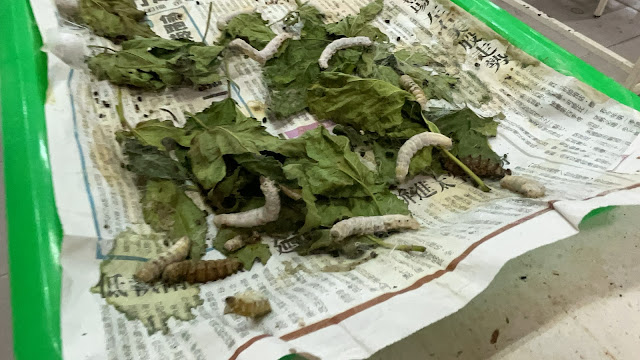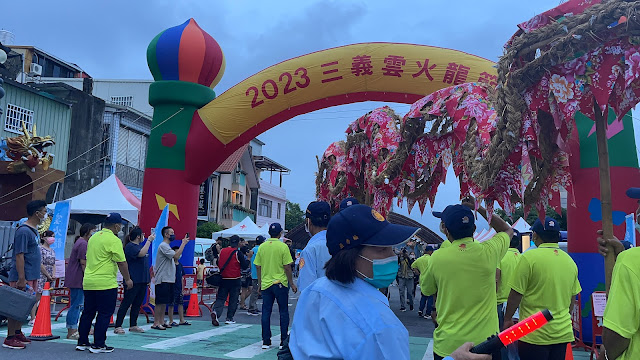Travel Date: 2023/06/25
Today, we drove around Miaoli, visiting a few places. We stopped at Ming-te Reservoir, the Silkworm Farm, Shitan Old Street, Wenchang Temple in Miaoli City, and then drove back to our home in Toufen.
We didn't do much over the 4-day long Dragon Boat Festival holidays because, unfortunately, our son got sick and had been coughing, so we had to skip going to the waterfall again.
One thing that can be easily spotted along roads in Miaoli are the "Watch out for wildlife" signs that feature leopard cats.
The endangered leopard cat is one of only two wild cat species native to Taiwan. Leopard cats don't look all that different from a house cat, with the most obvious difference being the white patch they have behind their ears. Miaoli County has a relatively large population of leopard cats, but development has endangered them. Local news often reports on more and more cats losing their lives under speeding cars...
Ming-te Reservoir (明德水庫)
We went to Ming-te Reservoir (明德水庫), but it's currently under renovation, so there wasn't much to see. We only drove around the road surrounding it. We stopped at Rixindao (日新島), which is an island on the water reservoir. The entrance fee is free for people living in Miaoli, but for others, it's 100NT. We didn't go inside anyway.
Unlike in other counties, Miaoli doesn't consider foreigners who have a household in Miaoli as residents, which is quite amusing. I've lived in Yunlin, Hsinchu, and Tainan previously, and after registering my household in those places, my ARC (Alien Resident Certificate) clearly stated that my living place was there. In Taiwan, the Taiwanese ID card also includes information about the spouse and child, so it's another proof that I am who I am and living in the exact same place as my spouse. Each time I visited places in any of those three counties, I wouldn't be asked to pay for a ticket because they counted me as residing in that particular city. However, it doesn't work the same way in Miaoli... I feel a bit upset (not because I would have to pay), but because I've been living here for almost a year (6 years in Taiwan), and things like this only happen in Miaoli. The guy selling tickets didn't even bother to check my ARC or my husband's ID card. He just told us straight away that we had to pay for the ticket... Actually, before we parked, we stopped to ask about the ticket price and what there was to see, and he was the only one who told us that people living in Miaoli could enter free of charge lol.
Check out my YouTube video
Silkworm Farm (泉明蠶寶寶生態教育農場)
Not far from the water reservoir is the Silkworm Farm (泉明蠶寶寶生態教育農場). I'm not a fan of bugs, although I haven't seen silkworms in real life before (or I'm not aware that the bugs I saw were actually silkworms), so we also went there for a while. At the entrance, I got to try their two special teas. However, I didn't know at that time that one of them was actually made from silkworm feces. Needless to say, I wouldn't dare to try it at all, lol.
At the Silkworm Farm, you can see silkworms at different stages of their lives. For me, the scariest stage is when they become moths. I don't know why, but moths always scare me...
Behind the building, you can also see the farm growing trees that the silkworms feed on. These trees are a type of mulberry tree.
Nearby this place, there is also an owl farm, but unfortunately, it wasn't open that day.
Shitan Old Street (獅潭新店老街)
After lunch, we continued our trip through the mountains and arrived at Shitan Old Street (獅潭新店老街). It wasn't busy at that time; I remember seeing a lot more people here in the past. If you are traveling around Miaoli, you can actually skip this place if you aren't in the area, as there isn't much to see here.
For our meal, we decided to eat at Rixin Restaurant (日新飲食店), which has been open for 50 years. The food was okay, perhaps not the best we've ever had, but it didn't taste bad either. The restaurant is quite popular in the area.
Wenchang Temple (苗栗文昌祠)
After lunch, we drove to Miaoli City. While passing through the city, we made a stop at Wenchang Temple (苗栗文昌祠). This temple was formerly known as Yingcai Academy (英才書院). It is dedicated to Wenchang Dijun, the deity of culture and literature. In addition to Wenchang Dijun, other deities like Confucius, Cangjie, and Kui Xing are also worshipped in the main shrine. During the Qing Dynasty era, the temple served as the county magistrate's office before a separate county hall was built.
Miaoli was originally an agrarian settlement, but in the 19th century, the city's growth saw the rise of an academic society. In 1882, five local scholars proposed the idea of building a temple dedicated to Wenchang Wang, and Wenchang Temple was completed in 1885. In 1889, when Miaoli County was established, it lacked a county hall, so county magistrate Lin Gui-fen set up his office within the temple. That same year, Yingcai Academy was established on the temple grounds as a shuyuan, a type of educational institution.
However, six years later, Yingcai Academy was shut down by Japanese authorities when Taiwan was ceded to Japan in the 1895 Treaty of Shimonoseki. Nevertheless, the temple continued to be a congregating place for scholars. In 1927, a group of academics formed Lishe (栗社), which regularly held public poetry readings in the temple. The temple itself suffered heavy damage during the 1935 Shinchiku-Taichū earthquake and was further affected when it was used by the Japanese as military barracks and government dormitories.
On 19 August 1985, the Miaoli County Government protected Wenchang Temple as a county-level monument, which allowed for preservation work to be carried out between 1997 and 2002.
Usually, the middle door to Wenchang Temple is closed to worshippers and can only be accessed by zhuangyuan, or people who achieve full marks on the Imperial examination. However, in 2007, the Miaoli County Government began hosting ceremonies to honor students for their academic achievements by allowing them to step through the middle door. Participants range from those who obtained doctorate degrees to those who acquired good grades on their high school entrance examinations. This is the only government-hosted event of its type in Taiwan.







































































